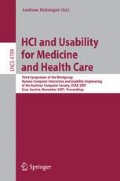Abstract
Medical researchers are constantly looking for new methods for early detection and treatment of incurable diseases. Cancer can severely hinder the lives of patients if they are not constantly attended to. Cancer patients can be assisted with the aid of constant monitoring by a support group and a continual sense of self-awareness through monitoring, which can be enabled through pervasive technologies. As human life expectancy rises, incidents of cancer also increase, which most often affects the elderly. Cancer patients need continuous follow-up because of the state of their disease and the intensity of treatment. Patients have often restricted mobility, thus it is helpful to provide them access to their health status without the need to travel. There has been much effort towards wireless and internet based health care services, but they are not widely accepted due to the lack of reliability and usability. In this paper, we present a software called Wellness Monitor (WM). The purpose of WM is to utilize the portability and ubiquity of small handheld devices such as PDAs, cell phones, and wrist watches to ensure secured data availability, customized representation, and privacy of the data collected through small wearable sensors. WM explores how the social and psychological contexts that encompass the patients could be enhanced by utilizing the same technology, an aspect which is mostly unexplored. A further goal was to provide continuous psychological assistance.
Access this chapter
Tax calculation will be finalised at checkout
Purchases are for personal use only
Preview
Unable to display preview. Download preview PDF.
References
Weiser, M.: Some Computer Science Problems in Ubiquitous Computing. Communications of the ACM 36(7), 75–84 (1993)
Kindberg, T., Fox, A.: System Software for Ubiquitous Computing. In: IEEE Pervasive Computing, pp. 70–81. IEEE Computer Society Press, Los Alamitos (2002)
Ahamed, S.I., Haque, M.M., Stamm, K.: Wellness Assistant: A Virtual Wellness Assistant using Pervasive Computing. In: SAC 2007, Seoul, Korea, pp. 782–787 (2007)
Sharmin, M., Ahmed, S., Ahamed, S.I.: An Adaptive Lightweight Trust Reliant Secure Resource Discovery for Pervasive Computing Environments. In: Proceedings of the Fourth Annual IEEE International Conference Percom, Pisa, Italy, pp. 258–263. IEEE Computer Society Press, Los Alamitos (2006)
Ahmed, S., Sharmin, M., Ahamed, S.I., GETS, (Generic, Efficient, Transparent, and Secured) Self-healing Service for Pervasive Computing Applications. International Journal of Network Security 4(3), 271–281 (2007)
Korhonen, S.I., Lötjönen, J., Sola, M.M.: IST Vivago—an intelligent social and remote wellness monitoring system for the elderly. In: ITAB. Proceedings of 4th Annu. IEEE EMBS Special Topic Conf. Information Technology Applications in Biomedicine, April 24–26, pp. 362–365 (2003)
Parkka, J., Van Gils, M., Tuomisto, T., Lappalainen, R., Korhonen, I.: A wireless wellness monitor for personal weight management, Information Technology Applications in Biomedicine. In: Proceedings IEEE EMBS International Conference, pp. 83–88. IEEE Computer Society Press, Los Alamitos (2000)
Korhonen, I., Lappalainen, R., Tuomisto, T., Koobi, T., Pentikainen, V., Tuomisto, M., Turjanmaa, V.: TERVA: wellness monitoring system, Engineering in Medicine and Biology Society. In: Proceedings of the 20th Annual International Conference of the IEEE, vol. 4, pp. 1988–1991 (1998)
Hopper, N., Blum, M.: Secure Human Identification Protocols. In: Boyd, C. (ed.) ASIACRYPT 2001. LNCS, vol. 2248, pp. 52–66. Springer, Heidelberg (2001)
Weis, S.A.: Security parallels between people and pervasive devices. In: Pervasive Computing and Communications Workshops, 2005. Third IEEE International Conference, pp. 105–109. IEEE Computer Society Press, Los Alamitos (2005)
Sharmin, M., Ahmed, S., Ahamed, S.I.: MARKS (Middleware Adaptability for Resource Discovery, Knowledge Usability and Self-healing) in Pervasive Computing Environments. In: ITNG. Proceedings of the Third International Conference on Information Technology: New Generations, Las Vegas, Nevada, USA, pp. 306–313 (2006)
Cognitive Walkthrough Strategy, http://www.pages.drexel.edu/~zwz22/CognWalk.htm
van Halteren, A., Bults, R., Wac, K., Dokovsky, N., Koprinkov, G., Widya, I., Konstantas, D., Jones, V., Herzog, R.: Wireless body area networks for healthcare: the MobiHealth project. Stud. HealthTechnol. Inform. 108, 181–193 (2004)
Maglaveras, N.: Contact centers, pervasive computing and telemedicine: a quality health care triangle. Stud. Health Technol. Inform. 108, 149–154 (2004)
Yao, J., Schmitz, R., Warren, S.: A wearable point-of-care system for home use that incorporates plug-and-play and wireless standard. IEEE Transactions of Information Technology in Biomedicine 9(3), 363–371 (2005)
National Cancer Institute: SEER (Surveillance, Epidemiology and End Results) Statistics of Cancer from all sites, http://seer.cancer.gov/statfacts/html/all.html
http://www.Chemotherapy.com/treating_with_chemo/treating_with_chemo.jsp
http://www.technologyreview.com/read_article.aspx?id=16467&ch=nanotech
Cernegie Mellon University: Molecular Biosensors and Imaging Center: http://www.mbic.cmu.edu/home.html
Holzinger, A., Errath, M.: Mobile Computer Web-Application Design in Medicine: Research Based Guidelines. Springer Universal Access in Information Society International Journal 1, 31–41 (2007)
Holzinger, A., Searle, G., Nischelwitzer, A.: On some Aspects of Improving Mobile Applications for the Elderly. In: Coping with Diversity in Universal Access, Research and Development Methods in Universal Access. LNCS, vol. 4554, pp. 923–932. Springer, Heidelberg (2007)
Kleinberger, T., Becker, M., Ras, E., Holzinger, A., Müller, P.: Ambient Intelligence in Assisted Living: In: Enable Elderly People to Handle Future Interfaces. LNCS, vol. 4555, pp. 103–112. Springer, Heidelberg (2007)
HIPAA, http://www.hhs.gov/ocr/hipaa
Tmotes: http://www.moteiv.com
Author information
Authors and Affiliations
Editor information
Rights and permissions
Copyright information
© 2007 Springer-Verlag Berlin Heidelberg
About this paper
Cite this paper
Islam, R., Ahamed, S.I., Talukder, N., Obermiller, I. (2007). Usability of Mobile Computing Technologies to Assist Cancer Patients. In: Holzinger, A. (eds) HCI and Usability for Medicine and Health Care. USAB 2007. Lecture Notes in Computer Science, vol 4799. Springer, Berlin, Heidelberg. https://doi.org/10.1007/978-3-540-76805-0_19
Download citation
DOI: https://doi.org/10.1007/978-3-540-76805-0_19
Publisher Name: Springer, Berlin, Heidelberg
Print ISBN: 978-3-540-76804-3
Online ISBN: 978-3-540-76805-0
eBook Packages: Computer ScienceComputer Science (R0)

